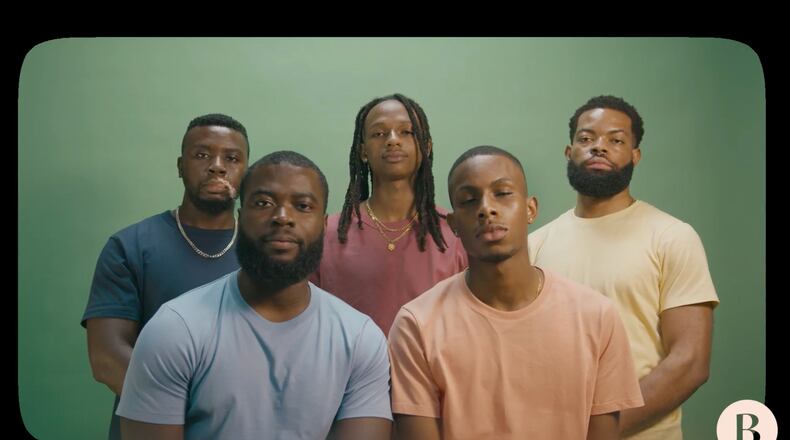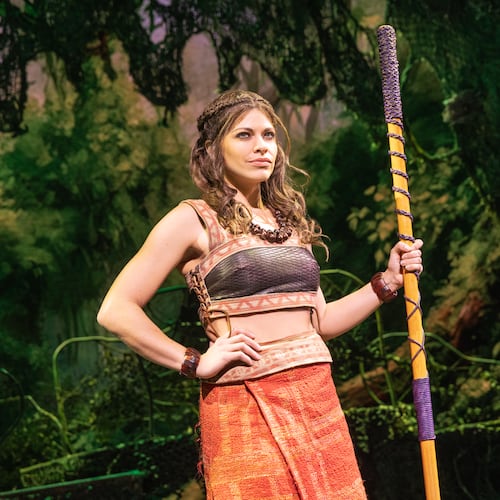In 2020, Atlanta’s De’Von Cross, 28, reached a low point with his mental health.
The COVID-19 pandemic was tearing across the city as well as the world and Cross, a nurse at Emory Healthcare, was in the eye of the storm.
“I was put on COVID units and worked tirelessly there. I had never seen so much death,” he said. “It got to a point where I just felt like I was drowning.”
Credit: Courtesy of De'Von Cross
Credit: Courtesy of De'Von Cross
Pandemic lockdown and safety measures made it impossible to visit medically vulnerable family members, like his mother who had been diagnosed with multiple sclerosis and fibromyalgia, back home in Huntsville, Alabama. At the same time, Cross said, he was in a rocky romantic relationship here in Atlanta, all while juggling an irregular workload due to the pandemic.
He became reclusive, he said, and it was a warning sign that his mental health was deteriorating. In response, Cross started looking for accessible mental health resources, eventually finding therapyforblackmen.org, an online database of therapists of color, where he connected with his current counselor.
“I had invested in this process of therapy and I set realistic expectations goals that I wanted to achieve,” he said. “It’s led me to this place now where much of my existence is navigating life using my own definition of kindness, and trying to be a light to a lot of black men.”
New York City-based Therapyforblackmen.org is just one of the many online resources made available to those struggling with mental health. In light of 2020′s troubles, a slew of mental health resources open to all creeds have gotten a second look from society, including mobile meditation apps like Calm or Headspace, as well as online portals like Talkspace and BetterHelp. There’s also the National Alliance on Mental Illness, which has a local chapter with community resources geared toward everything from substance abuse to homelessness.
But if Atlanta-based licensed professional counselor Amber Dee has her way, similar services will be available specifically to men like Cross and others throughout the city.
Credit: Courtesy of Black Female Therapists
Credit: Courtesy of Black Female Therapists
“If we continue to talk about [mental health], we start breaking that stigma. [Therapy] doesn’t mean that you’re weak,” Dee said. “Actually, it means that you’re strong because you’re being proactive so that you can be there for your family, for your partners, for yourself.”
Since 2018, Dee has managed Black Female Therapists, an online directory connecting Black women with counselors that look like them. The global pandemic and 2020′s social justice movement following the murder of George Floyd brought mounting societal grief and anxiety. To help alleviate these pressures, Dee’s efforts were featured on The Black Parade Route, an online directory of Black businesses launched by singer Beyonce.
Recently, Dee has turned her sights toward Black men, who are reportedly less likely to seek counseling. To usher in Mental Health Awareness Week and World Mental Health Day (on Oct. 10) this month, she’s launching Black Male Therapists online directory. There are also plans for a week of virtual, mental health-centered events and free one-on-one therapy with men and women therapists.
Last year, the pandemic leveled communities, especially those of color, with the Centers for Disease Control and Prevention reporting that Black people are two times more likely to die from COVID-19 than their white counterparts. The Economic Policy Institute reports similar findings in that Black workers face racism and economic equality, making those communities more susceptible to the effects of COVID-19.
With that in mind, Dee felt it was vital to get the project up and running, offering Black men an opportunity to talk with someone who looked like them and understood their lived experience, she said. “It’s not about colors, it’s about culture and understanding those nuances,” she said.
More often than not, that nuance is systemic racism, said Timothy Moore, Ph.D., who serves as interim chair of the Department of Psychology at Clark Atlanta University. Per Moore, there are socioeconomic factors that go into the lived experience of Black communities, making working with a non-Black counselor challenging.
“We’ve been dealing with Black men trying to protect themselves and Black communities, and you’ve got the system targeting them,” Moore said. “All those challenges create a mental health crisis, where black males [have] to survive in an environment where you’re targeted.”
There’s also the challenge in the lived experiences of Black men and Black women, Moore said. But historically, women have played a pivotal role in the liberation of the Black community. Dee’s efforts are no different, according to Moore.
“When we stop looking at the storylines of Black men and Black women fighting against one another versus the storylines that show us working together, that’s where we need to emphasize things,” the professor said.
Since experiencing therapy for himself, Cross has launched his own individual efforts to break the stigma around Black men and mental health. He wants mental health to be a regular talking point, not one that happens exclusively around crisis, he said. On his Instagram page, he has a link to the Therapyforblackmen.org site in his bio and regularly posts about mental health. According to Cross, he’s gotten a flurry of direct messages asking for advice in starting a mental health journey.
“It’s something that we have glossed over for the past few years, if not decades,” he said. “Now, if there’s any shift that I see happening, it’s men having a willingness to just say, ‘I’m not okay’.”
About the Author
Keep Reading
The Latest
Featured



